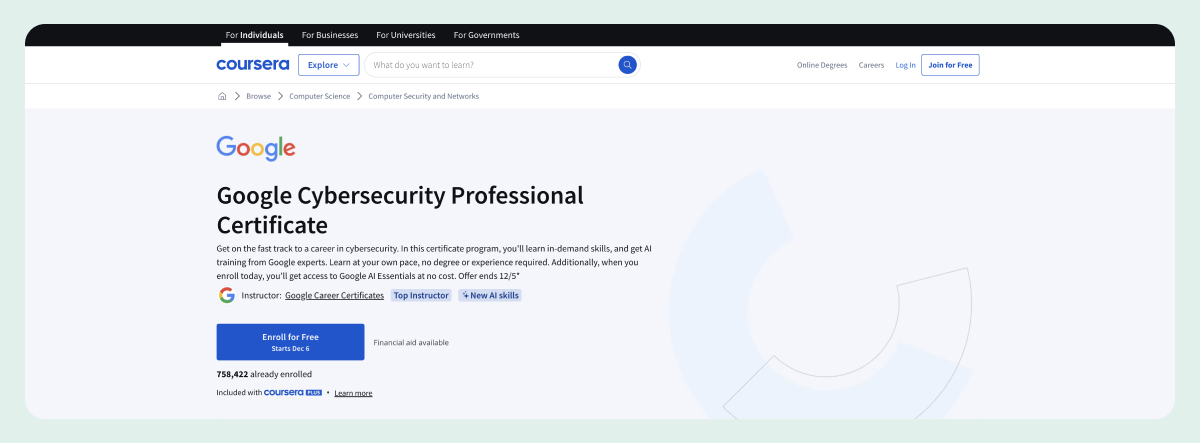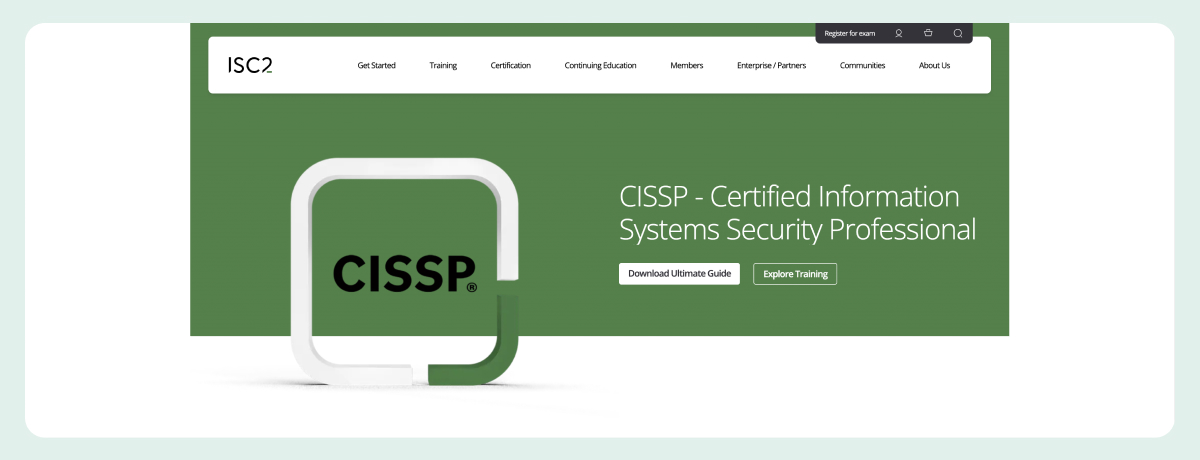Cybersecurity is a promising career field, with over 3.5 million unfilled positions projected in 2025. In 2023 alone, there were 750,000 unfilled positions in the US.
According to the Bureau of Labor Statistics, employment in cybersecurity (information security analysts) is projected to grow by 33% from 2023 to 2030, faster than any other occupation. Furthermore, the entry-level cybersecurity position can offer a $60-80K annual salary.
Cybersecurity is a promising career that can lead to high-paying jobs. But how do you get started in cybersecurity?
In this guide, we will present a complete roadmap for starting your career in cybersecurity. Let's head right to it!
Popular cyber security roles and their salaries
Before we get into the details of cybersecurity courses and other stuff, let’s first see how much you can earn choosing this career.
Cybersecurity is a broad term that involves various specialized roles. The popular roles and their average salaries in the US are as follows:
- Junior cybersecurity analyst: $90K
- IT security administrator: $85-90K
- Intrusion detection specialist: $70K
- Incident response analyst: $65-70K
- Penetration tester: $100K
- Security engineer: $115K
- Security architect: $200K
The above-average salaries suggest that you can start earning a handsome salary if you pursue a cybersecurity career.
Can you get a cybersecurity job without an educational background or experience?
Many professionals looking to start or switch careers in cybersecurity ask the same question: Can I get a cybersecurity job without an educational background or experience?
Some professionals may have a bachelor in electrical engineering, while others may not have a bachelor's degree or any relevant experience.
Cybersecurity is a field that relies more on skills rather than educational backgrounds or experiences. The recruiter will evaluate your skills and the certifications you have completed.
You can easily grasp an entry-level job if the recruiter finds you to have exceptional technical and soft skills.
Why choose cybersecurity?
Although high salaries will be enough for some to justify cybersecurity as the best career, it's not the only reason to consider it. Other reasons that make cybersecurity an ideal career include:
1. High employment rates: Due to ever-increasing cyber threats, cybersecurity skills will be in demand today and in the coming years. Compared to other careers/fields, cybersecurity offers one of the highest employment rates worldwide.
2. Diverse career paths: Cybersecurity offers diverse career paths. You can choose from many specialized roles, such as security architect, penetration tester, cloud security expert, etc.
3. Job satisfaction: Cybersecurity professionals are more satisfied with their jobs. In fact, 76% of professionals have reported job satisfaction in a survey.
In addition to these three main reasons, cyber security provides continuous learning opportunities and keeps professionals engaged with new challenges.
Essential skills for a cybersecurity professional
You must have a few essential skills to have a successful cybersecurity career. Here is a list of well-rounded technical and soft skills cybersecurity experts must possess:
Technical skills in network security
- Programming languages
- Network security and protocols
- Incident response and threat management
- Security tools
- Reverse engineering
- Encryption and cryptography
- Risk management
Soft skills
- Critical thinking
- Problem-solving
- Communication
- Adaptability
- Teamwork
- Stress management
All the above skills make a cybersecurity expert a competent professional who can handle challenges proficiently and collaborate effectively.
How to get started in cyber security
Now that you have decided to pursue a cybersecurity career, here’s a complete roadmap to get you started:
1. Enroll in online courses
Enrolling in online courses is the first step in entering the cybersecurity world. You must first gain the fundamental knowledge of cybersecurity.
One of the best courses to start with is the Google Cybersecurity Professional Certificate. It is an 8-course series, including:
- Foundations of Cybersecurity
- Play It Safe: Manage Security Risks
- Connect and Protect: Networks and Network Security
- Tools of the Trade: Linux and SQL
- Assets, Threats, and Vulnerabilities
- Sound the Alarm: Detection and Response
- Automate Cybersecurity Tasks with Python
- Put It to Work: Prepare for Cybersecurity Jobs

Once you have completed this course, you will have a proper understanding of cybersecurity practices, hands-on experience with Python, and much more.
You can enroll in other online courses besides the Google Cybersecurity Professional Certificate. To find different available courses, explore Coursera, Udemy, edX, and other platforms.
Once the basics are cleared, you should opt for more advanced courses related to specific cybersecurity roles. Some of the advanced-level courses you can enroll in include:
- Next-Generation Firewalls and Intrusion Prevention
- Advanced Threat Hunting and Incident Response
- Introduction to Applied Cryptography
Simply put, you should first grasp cybersecurity fundamentals well and then pursue more advanced courses on specific cybersecurity roles.
2. Get cybersecurity certifications
Doing online courses is not enough. You also have to get cybersecurity certifications. A certification is proof of your knowledge and skills to employers. Many times, it is the certifications that get you the job.
Some of the most common certifications are:
CompTIA Security+
CompTIA Security+ is an entry-level certification that verifies that the professional has the core skills required for a cybersecurity role. With this certification, you can evaluate the security of the organization, IoT environments, cloud, and more.
Certified Ethical Hacker (CEH)
Ethical hacking, or penetration testing, is legally hacking an organization to uncover vulnerabilities. A CEH certification validates you have skills in attack detection, penetration testing, and similar areas.
Certified Information Systems Security Professional (CISSP)
The CISSP certification is one of the most recognized and prestigious credentials in the cybersecurity industry. This certification reflects that you are experienced in designing, implementing, and monitoring cybersecurity programs. However, you can only qualify for this certification once you have gained five or more years of experience in two of eight cybersecurity domains. So, schedule it for later once you have professional career experience.

Offensive Security Certified Professional (OSCP)
The OSCP certification is essential for penetration testing and ethical hacking roles. It demonstrates expertise in offensive security measures, enabling professionals to effectively identify and mitigate system vulnerabilities. This certification is highly regarded in the cybersecurity field, particularly for consulting and testing roles.
Other than the above four certifications, you can pursue many more, such as:
- Certified Information Systems Auditor (CISA)
- Certified information security manager (CISM)
- GIAC certified incident handler (GCIH)
The goal should be to get the essential certifications that make you stand out from others and reflect your skills and credibility.
3. Get practical experience
Enrolling in online courses and getting certifications are essential to developing skills, but you need practical skills (hands-on) experience to master those skills.
There are many ways to get practical experience in cybersecurity.
Internships
Many organizations offer internship programs to let new cybersecurity professionals get hands-on experience. When you join an internship program, you get real-world exposure to all the concepts you learned in courses.
For example, you will learn security designs, operating systems vulnerability assessment, incident response, penetration testing, digital forensics, audits, and more. These activities will solidify your concepts and train you to work in real-world scenarios.
Another advantage of an internship is that you get to work with experienced cybersecurity professionals. This helps you learn more from their expertise and enhance your skills.
Open-source projects
The second way to get hands-on experience is to get involved in open-source projects. Dozens of open-source projects require contributions from cybersecurity professionals to enhance security features, identify vulnerabilities, and more.
Contributing to open-source projects gives you more practical exposure to your skills. Furthermore, you may get direct job offers from recruiters secretly looking for new hires.
To contribute to open-source projects, you can use GitHub and similar platforms, explore available cybersecurity projects, and contribute to the ones that align with your expertise.
Competitions
There are many cybersecurity competitions, such asCapture the Flag (CTF) events, designed to empower participants to develop skills. In these competitions, participants are challenged to test their skills in different areas, such as web security, cryptography, reverse engineering, and more.
Competitions also provide the opportunity to attract the attention of employers. In fact, many competitions are government-sponsored. So, explore cybersecurity competitions, participate in them, and uplift your skills.
4. Network and join cybersecurity communities
Networking has become essential considering the world's digitalization and rapid pace of new technological advancements. You can join cybersecurity communities, participate in webinars, attend conferences, and more.
Some of the benefits you will get with networking include:
- Stay informed: Networking helps you stay current with industry trends, new technologies, and tools.
- Engage with experts: You will have the chance to engage with experts and learn from their extensive experience. You can ask them questions, share valuable insights, and more.
- Get internships and job opportunities: Interacting with professionals can lead to internships or job opportunities. In fact, referral-based job filling is a common phenomenon seen almost everywhere.
- Get career guidance: The cybersecurity communities can guide you to excelling in your career. You can hear about other journeys and get career guidance, which can expedite job placement.
- Build credibility: Networking and interacting in communities help you build credibility. You get a place to showcase your expertise and get acknowledgment.
Start looking for entry-level cybersecurity jobs
Now that you’re a certified, skilled, and experienced cybersecurity professional, it’s time to start looking for entry-level cybersecurity jobs. Before that, create a compelling resume listing all your certificates and experience. Afterward, you can explore many job portals to find entry-level jobs related to your interests. Some of the best platforms to explore jobs include:
- LinkedIn: Best for networking and job searching. You can connect with industry professionals and regularly post about your activities, certifications, and more. This can lead to recruiters connecting directly. Besides that, you can use its job filters to find the best entry-level job that aligns with your expertise.
- Indeed: Indeed is another good job board for exploring job listings related to cybersecurity. You can filter the searches based on your preferred location, experience, and more. Based on that, you can find and apply for the right jobs.
- CareersinCyber.com: This job portal lets you get various cybersecurity jobs in different domains.
- Dice: Dice is a well-known tech industry job portal. It is also a perfect place to find cybersecurity jobs that match your preferred experience level and location.
- ZipRecruiter: ZipRecruiter also allows you to use search filters to find high-paying cybersecurity jobs.
In short, you have plenty of platforms to explore and find your dream job to start a career in cybersecurity.
How do you choose the right career path in cybersecurity?
Cybersecurity is a very diverse field, so choosing the right role in cybersecurity becomes overwhelming. Simply put, we all want to choose a cybersecurity role that can lead to easy job placement with a high salary. So, how do you choose the right career path in cybersecurity?
Check out these three tips that will help you choose the right role in cybersecurity:
1. Evaluate your interests
You should choose the cybersecurity role that best aligns with your interests. For example, some professionals like analyzing and mitigating risks, so a cybersecurity analyst or incident responder is a great fit. Similarly, some like hacking, so a penetration tester is a better fit.
2. Try out different roles
Try out different roles if you cannot find a role based on your interests. Take courses and do some practical work for different roles. Soon, you will be able to identify your strengths.
3. Explore available jobs and salary
If you are confused about choosing between 2-3 roles, explore their available jobs and salary. This way, you can choose one with more jobs and high-paying salaries.
Wrapping up
This guide taught us how to get started in cybersecurity with or without a relevant educational background. We can see the promising potential of this field in the coming years and the diverse roles it offers. If you are committed to becoming a cybersecurity expert, begin with the abovementioned roadmap, develop the skills, and grab the right opportunities!
FAQs
Q1. What qualifications are required to start a cybersecurity career?
A cybersecurity career depends more on skills and certifications rather than academic studies. However, you should have a strong foundation in information technology and computer science. Secondly, you must have certifications in your preferred cybersecurity roles.
Q2. How do you get practical experience in cybersecurity?
You should look for entry-level positions in cybersecurity firms or target internships or volunteer opportunities. Alternatively, you can contribute to open-source projects or participate in competitions for more practical experience.
Q3. Do I need higher education to pursue cybersecurity?
Although a bachelor's or master's degree is not necessary to pursue a cybersecurity career, they can provide a solid foundation. The recommended approach is to pursue higher education and get certifications to succeed in cybersecurity.
Q4. Does cybersecurity require coding?
Yes, coding is a must-have skill for cybersecurity professionals. Python is a commonly used programming language in the cybersecurity field. You may have to code to develop security tools, interpret vulnerabilities, etc.


